Gateway to European Education
Cyprus Study Visa
Cyprus is a beautiful island country in the Eastern Mediterranean, known for its rich culture, history, and excellent education system.
Unlock Your Career Abroad
Cyprus Study Visa
It is a member of the European Union (EU), offering students the advantage of internationally recognized degrees and mobility across Europe. The country blends a Mediterranean lifestyle with modern infrastructure, making it an attractive destination for international students.
Cyprus is an emerging higher education destination in Europe, offering affordable tuition, English-taught programs, and a safe environment for international students. At SWICS Pvt. Ltd., we provide end-to-end support for students who wish to study in Cyprus, from admission to visa filing and settlement.
Why Students Prefer Cyprus
for Higher Education
- Affordable Tuition Fees – Compared to many European countries, Cyprus offers low-cost education without compromising quality.
- English-Taught Programs – Many universities and colleges provide courses fully in English, making it accessible for international students.
- International Recognition – Degrees from Cyprus are recognized worldwide, especially across the European Higher Education Area (EHEA).
- Safe & Multicultural Environment – Cyprus is one of the safest countries in Europe, with a welcoming international community.
- Easy Admission Process – Flexible entry requirements and straightforward visa process attract many Indian and Asian students.
- Work Opportunities – Students can work part-time (20 hours/week) during studies, and full-time during breaks.
- Gateway to Europe – Being in the EU, studying in Cyprus opens opportunities for further education and jobs in other European countries.

Important Facts About Cyprus
- Capital: Nicosia
- Population: ~1.2 million
- Currency: Euro (€)
- Official Languages: Greek & Turkish (but English widely spoken, especially in education and business)
- Climate: Mediterranean – hot summers, mild winters
- EU Membership: Full member since 2004
- Education System: Mix of public and private universities, plus specialized colleges in tourism, business, IT, and healthcare
- Intakes: September/October (main intake), February/March (secondary intake)
- Living Costs: €700–€1,000/month (affordable compared to Western Europe)
- Safety Ranking: Among the top safest countries in the EU
Why Choose Cyprus for Higher Education?
Most universities offer courses in English at Bachelor’s, Master’s, and PhD levels.
Bachelor’s: €4,000–€8,000/year | Master’s: €5,000–€12,000/year.
Degrees are recognized across Europe and globally.
Cyprus is known for its safety, Mediterranean lifestyle, and diverse student community.
Students are allowed to work part-time during studies.
As an EU member state, Cyprus provides mobility options within Europe.
Types of Institutions in Cyprus
Public Universities
Government funded, affordable, and research-oriented.
Private Universities
Modern infrastructure, wide range of English programs.
Colleges & Institutes
Focused on vocational training, hospitality, business, and IT.
Universities in Cyprus (Public & Private)
These are the higher education institutions that grant Bachelor, Master, PhD, etc.
- University of Cyprus (public )
- Cyprus University of Technology (public)
- Open University of Cyprus (public)
- Frederick University (private)
- European University Cyprus (private)
- University of Nicosia (private)
- Neapolis University Pafos (private)
- University of Central Lancashire Cyprus (UCLan Cyprus)
- Philips University
- American University of Cyprus (AUCY)
- University of Limassol
- American University of Beirut – Mediterraneo (Paphos)
Colleges & Institutes in Cyprus
| College / Institution | Type / Specialisation |
|---|---|
| American College (Nicosia) | Private College |
| Alexander College | Private / Tertiary Education |
| Atlantis College | Private College |
| Casa College | Private College |
| CDS / C. D. A. College (CDA College) | Private College |
| College Of Tourism / Hotel Management (Nicosia) | Vocational / Hospitality & Tourism |
| Freshart College of Arts | Private College |
| Global College | Private College |
| Institute of Professional Studies (IPS) – UCLan Cyprus | Private / Professional Studies |
| InterNapa College | Private College |
| KES College | Private College |
| Larnaca College | Private College |
| Mesoyios College (Limassol) | Private College |
| The Philips College | Private College |
| CTA / CTL EuroCollege (Limassol) | Private / Vocational / Tertiary Education |
| Susini College | Private College |
Popular Courses in Cyprus
- Business & Management – International Business, MBA, Finance, Marketing
- Tourism & Hospitality – Hotel Management, Culinary Arts, Travel & Tourism
- Health Sciences – Nursing, Public Health, Healthcare Management
- Engineering & IT – Computer Science, Software Engineering, Data Science
- Law & Social Sciences – International Law, Political Science, Education
- Arts & Humanities – Liberal Arts, Media Studies, Design, Cultural Studies
- Agriculture & Environment – Agricultural Economics, Environmental Studies

Intakes in Cyprus
September / October (Fall Intake)
February / March (Spring Intake)
Admission Requirements
- Completed high school (for Bachelor’s) or Bachelor’s degree (for Master’s).
- Academic transcripts & certificates.
- Passport (minimum validity of 1 year).
- English language proof (IELTS/TOEFL not always compulsory, many universities accept medium of instruction certificates).
- CV / Resume (for Master’s & PhD).
- Statement of Purpose (SOP) & Recommendation Letters (if required).
Cyprus Study Visa Requirements
- Valid passport (minimum validity 1 year).
- Admission letter from a recognized university/college in Cyprus.
- Completed visa application form.
- Recent passport-size photographs.
- Academic transcripts & certificates.
- Proof of sufficient funds (bank statements, sponsor’s affidavit).
- Police clearance certificate (PCC).
- Medical examination report (HIV, Hepatitis B & C, TB, Chest X-ray).
- Payment receipt of tuition fees (at least 1st semester).
Work Rights for Students in Cyprus
- International students can work 20 hours per week in specific sectors like hospitality, agriculture, retail, and food services.
- Part-time work is allowed during study terms; full-time work is possible during holidays.
Processing Time
- Visa processing usually takes 4–6 weeks depending on the embassy and application completeness.

How SWICS Pvt. Ltd. Helps You
At SWICS, under the guidance of Er. JP Singh and Advocate Trimaandeep Singh, we provide complete assistance for Cyprus Study Visa:
- Course & University Selection – Matching your profile with the right institution.
- Application Processing – Admission letters, SOPs, and documentation.
- Visa Filing & Legal Compliance – PCC, medicals, and embassy filing handled with expertise.
- Pre-Departure Guidance – Accommodation, travel, and settlement advice.
- Legal Support in Refusals – Strong re-application strategy in case of visa rejection.

Our Dedicated Team
Guides you through admission, visa filing, accommodation, and settlement in Cyprus.

Er. JP Singh (Managing Director)

Advocate Trimaandeep Singh

mr. chandan sharma
Visa Success Stories

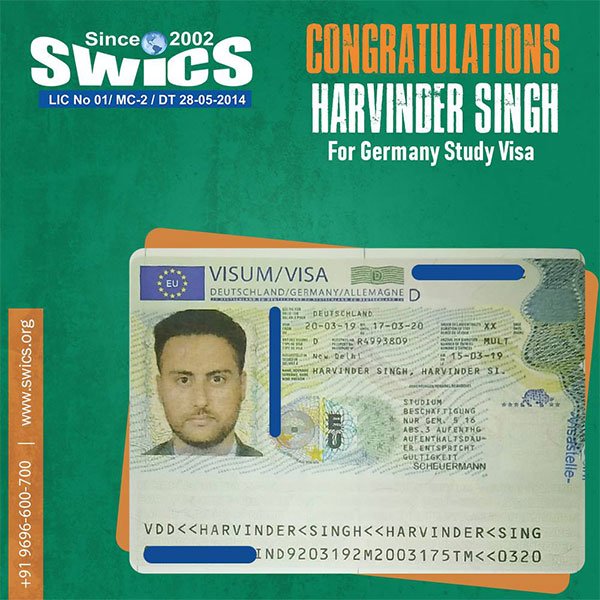



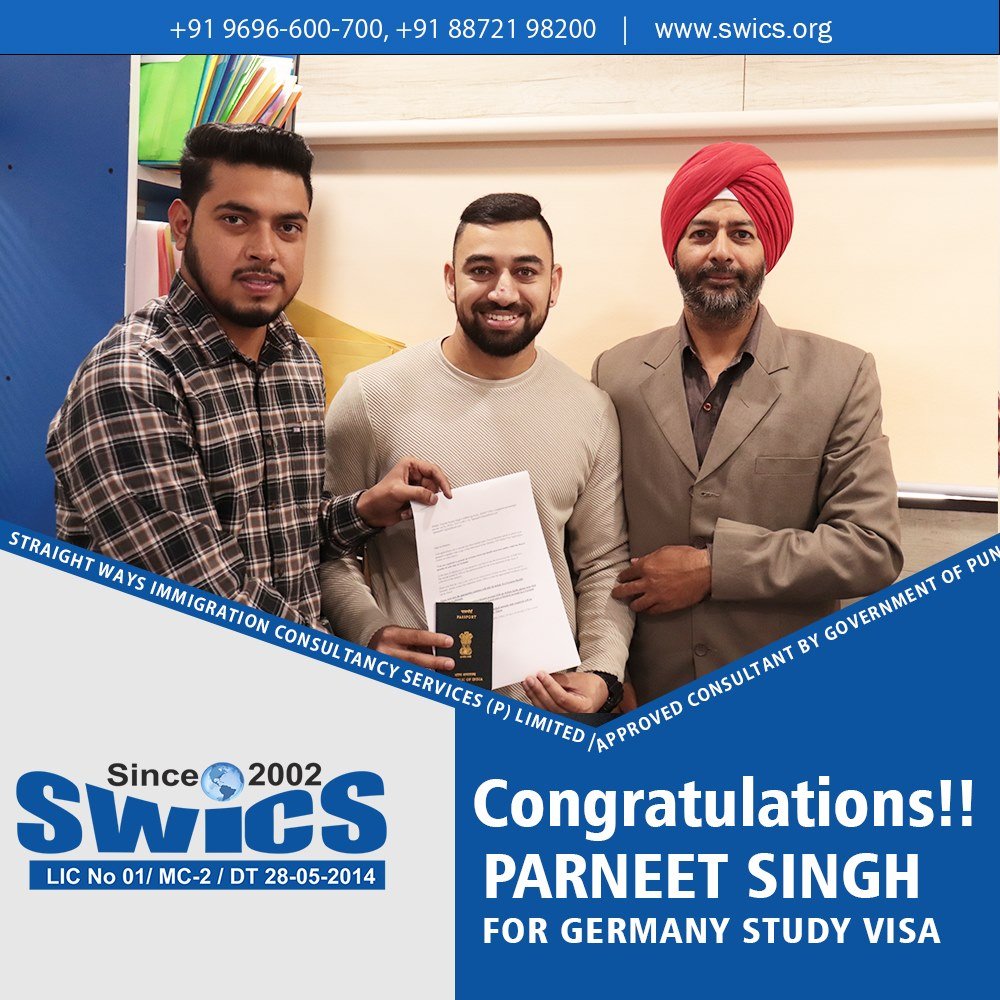

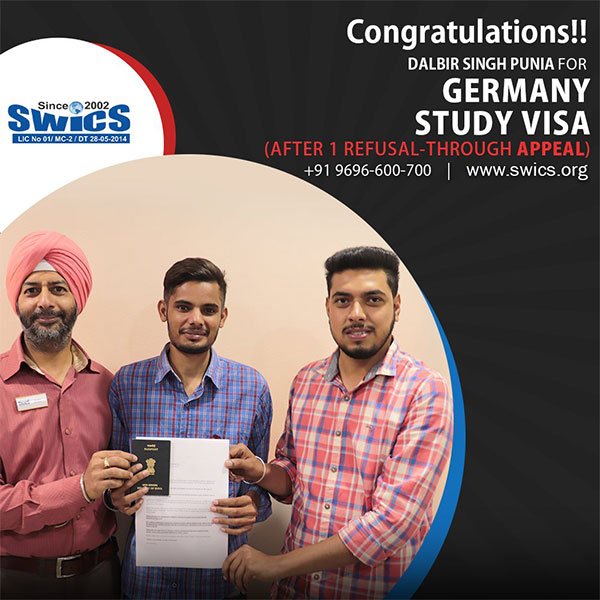

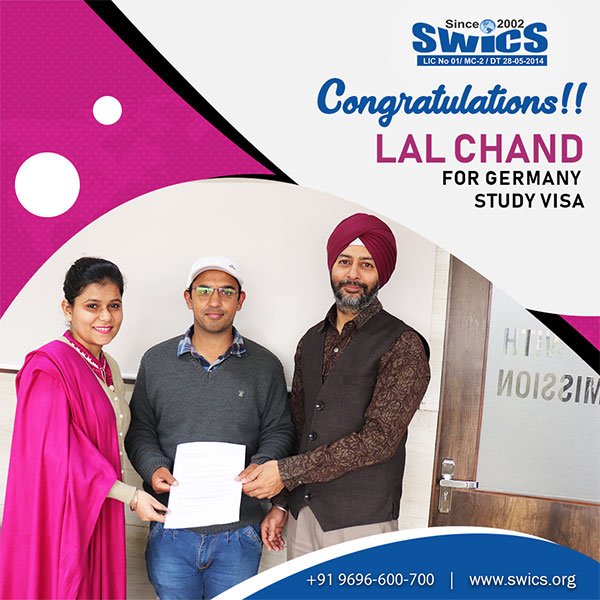
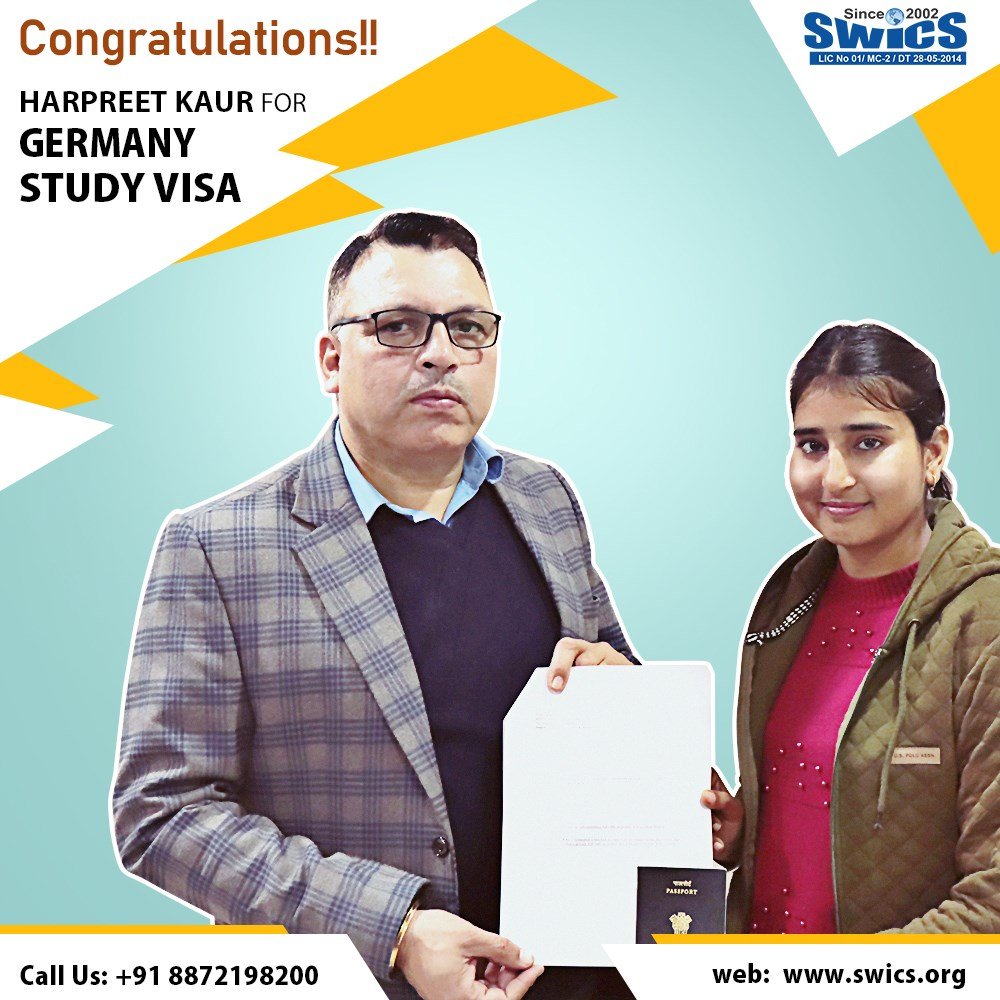

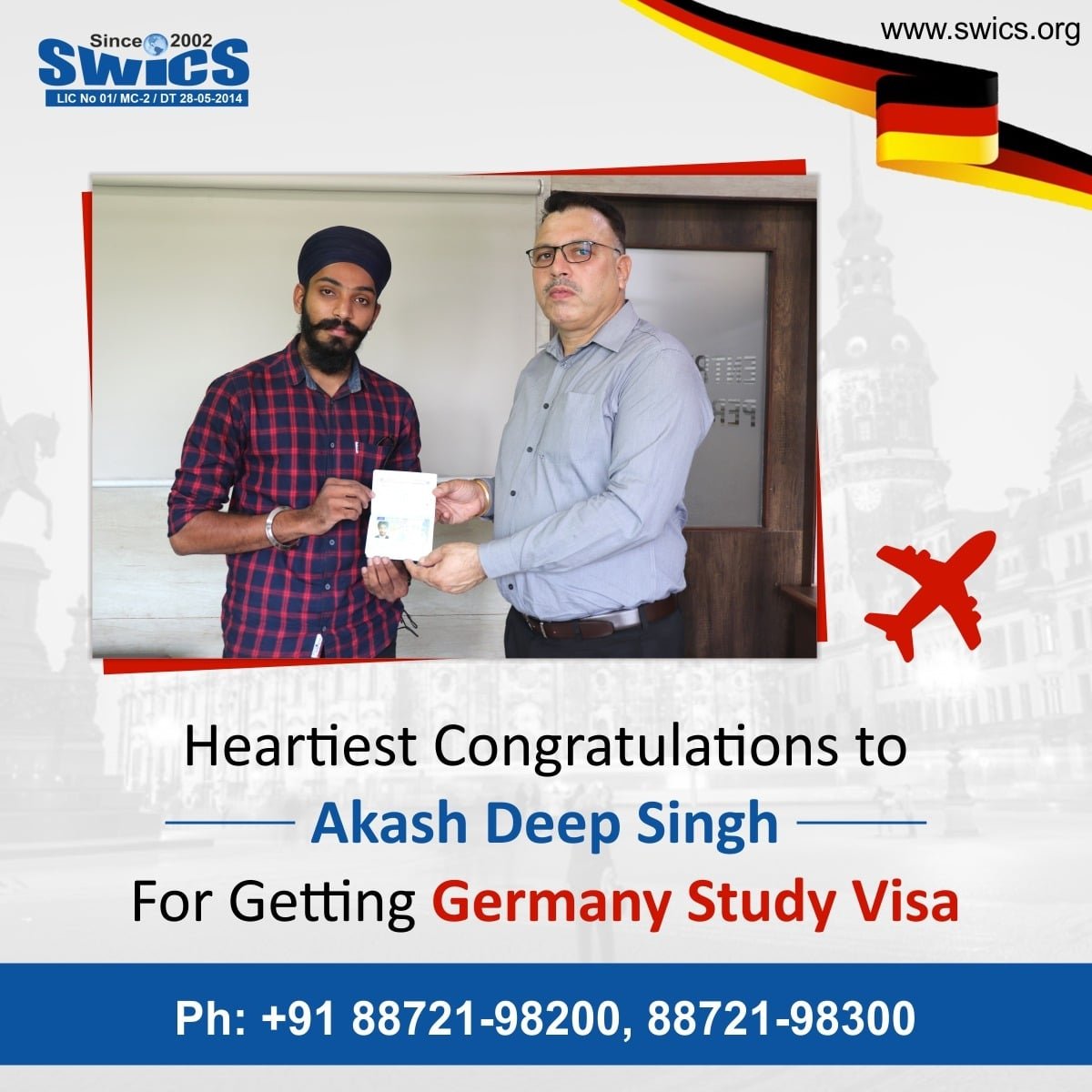
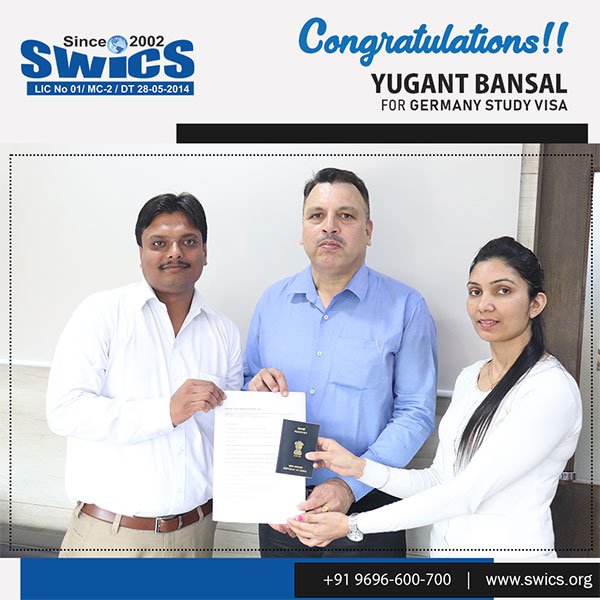

Cyprus Study Visa – Frequently Asked Questions (FAQ)
Cyprus offers affordable tuition fees, English-taught programs, international recognition, and a safe environment. Many Indian and Asian students prefer Cyprus because the admission process is simpler compared to other EU countries. At SWICS Pvt. Ltd., under the guidance of Er. JP Singh, we help students identify the best universities and colleges based on their career goals and budget.
Cyprus has:
- Public Universities (low tuition, government-funded)
- Private Universities (more English programs, modern facilities)
- Colleges (vocational, professional, diploma programs)
- Specialized Institutes (hospitality, business, IT, healthcare)
Advocate Trimaandeep Singh ensures that all institutions we recommend are recognized and compliant with immigration requirements.
Some well-known universities include:
- University of Cyprus
- Cyprus University of Technology
- University of Nicosia (UNIC)
- European University Cyprus (EUC)
- Frederick University
- Neapolis University Pafos
- UCLan Cyprus
Our SWICS counselors provide detailed comparisons to help you select the right fit.
Yes. Cyprus has respected colleges like American College, Alexander College, CDA College, Global College, InterNapa College, Mesoyios College, and KES College. These focus on hospitality, business, IT, and professional diplomas. SWICS maps your career path to either university or college based on your background.
- Valid passport
- Academic transcripts (10th, 12th, Bachelor’s if applying for Master’s)
- Proof of English proficiency (IELTS/TOEFL or medium of instruction)
- Passport photos
- Statement of Purpose (SOP) & CV (for higher studies)
- Police clearance certificate
- Medical reports
At SWICS, Advocate Trimaandeep Singh ensures every file is legally compliant with embassy rules.
- Bachelor’s: €4,000–€8,000 per year
- Master’s: €5,000–€12,000 per year
- Living costs: €700–€1,000 per month
Er. JP Singh helps students budget properly by creating a settlement plan covering tuition, accommodation, and living expenses.
Yes. International students can work 20 hours per week during studies and full-time during holidays in sectors like hospitality, retail, food service, and agriculture. Our SWICS team guides you in understanding legal work rights.
Yes. Cyprus is one of the safest EU countries, with low crime rates and a multicultural environment. Parents often choose Cyprus because of its security and student-friendly culture.
Not always. Many universities accept students with a medium of instruction certificate instead of IELTS/TOEFL. At SWICS, we guide you to institutions where IELTS is not mandatory if you qualify.
- September/October (Fall) – Major intake
- February/March (Spring) – Secondary intake
SWICS ensures timely applications so students never miss deadlines.
Visa processing usually takes 4–6 weeks. With SWICS documentation expertise, students avoid delays caused by missing or incorrect papers.
You must submit medical reports for HIV, Hepatitis B & C, Tuberculosis (X-ray), along with a general fitness certificate. Advocate Trimaandeep Singh ensures all medical documentation meets embassy standards.
- Admission letter from a Cyprus university/college
- Completed visa form
- Passport valid for at least 1 year
- Academic certificates
- Proof of tuition fee payment (1st semester)
- Bank statements/funding proof
- PCC & medical reports
SWICS prepares checklists so students don’t miss any requirement.
Our SWICS team helps with:
- Student registration with immigration authorities
- Health insurance purchase
- Opening a bank account
- Accommodation guidance
- Part-time job support
This ensures students feel fully supported after landing.
Yes. Many students come to us after facing refusal. Advocate Trimaandeep Singh drafts appeal letters, legal justifications, and re-application files that address refusal reasons clearly.
Yes. Degrees are recognized in the European Higher Education Area (EHEA) and globally. Many students use Cyprus as a pathway to further studies or careers in Europe.
Yes. While scholarships are limited compared to Germany, many universities offer partial tuition fee waivers (10–50%) for academic merit. SWICS assists in preparing strong scholarship applications.
Because SWICS is government-approved, experienced, and legally backed:
- JP Singh → 22+ years in overseas education, expert in course selection.
- Advocate Trimaandeep Singh → Legal specialist for documentation & refusals.
- SWICS Germany & Cyprus teams → On-ground support for admissions and settlement.
This 3-tier expertise makes us one of the most reliable consultancies.
- Bachelor’s: 3–4 years
- Master’s: 1–2 years
- PhD: 3–4 years
Colleges offer diplomas/associate degrees of 1–2 years.
Yes. As Cyprus is part of the EU, your degree is recognized across Europe. You may apply for further studies, exchange programs, or work opportunities in other EU states.
After completing studies, you may:
- Apply for a work permit in Cyprus.
- Transition to another EU country for higher studies or jobs.
- Use your degree to pursue opportunities worldwide.
SWICS helps students design career roadmaps before graduation

